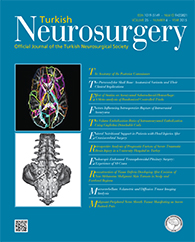2Medical School of Xi’an Jiaotong University, The First Affiliated Hospital, Department of Rehabilitation Medicine, Xi’an, Shaanxi Province, China
DOI : 10.5137/1019-5149.JTN.9701-13.1 AIM: The role of statins for treating aneurysmal subarachnoid hemorrhage (aSAH) remains uncertain. In this study, the relevance of different end points was evaluated in order to clarify the action and efficacy of statins.
MATERIAL and METHODS: A systematic literature retrieval was carried out to obtain randomized controlled trials (RCTs) from before March 2013 on the use of statins for aSAH. Data extraction and quality evaluation of the studies were performed by 2 investigators. A meta-analysis was performed using Review Manager (RevMan) software version 5.2.3.
RESULTS: Seven randomized controlled trials comprising 347 patients that met the inclusion criteria were included in this meta-analysis. Results showed that, in aSAH, statins did not reduce vasospasm on transcranial Doppler (RR=0.80; 95% CI, 0.53-1.21; p=0.29) or improve outcomes (RR=0.92; 95% CI, 0.71-1.20; p=0.54). However, statins were able to decrease delayed ischemic neurological deficits (RR=0.56; 95% CI, 0.41-0.75; p=0.0001) and mortality (RR=0.54; 95% CI, 0.32-0.91; p=0.02) compared with placebo.
CONCLUSION: Acute statin treatment might not be a good choice for cerebral vasospasm after aSAH. Further large-scale, well-designed RCTs on this topic are still needed.
Keywords : Statins, Aneurysmal subarachnoid hemorrhage, Meta-analysis, Transcranial doppler




